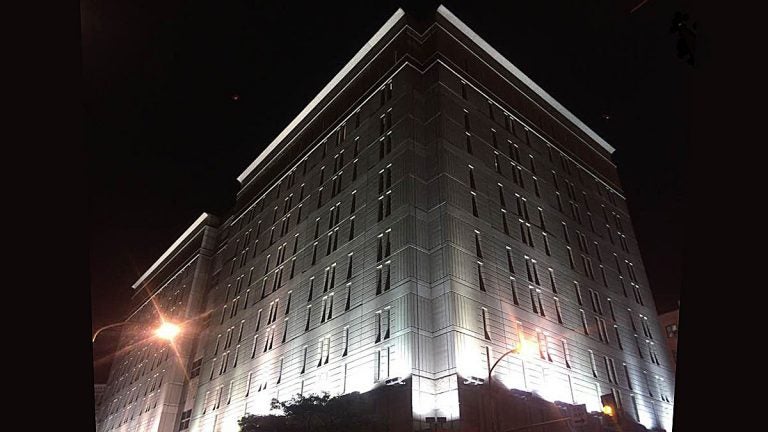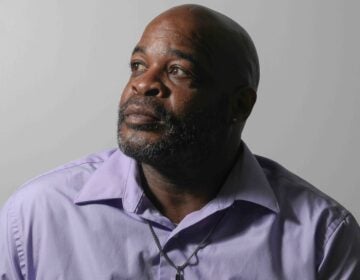Inmates sue Philly’s Federal Detention Center for right to see loved ones while they await trial
Two current inmates are suing Philadelphia's Federal Detention Center to overturn a policy that blocks some of their loved ones from visiting them as they await trial.
Listen 0:00
The Federal Detention Center in Philadelphia lit up at night. (Alan Tu/WHYY)
Two current inmates are suing Philadelphia’s Federal Detention Center to overturn a policy that blocks some of their loved ones from visiting them as they await trial.
The suit, filed Thursday against warden Sean Marler, aims to overturn the center’s rule barring visits from anyone who is not “immediate family.”
The policy, implemented in July 2016, allows parents of all flavors, siblings, spouses and children to visit pretrial inmates. Everyone else is off limits, including boyfriends and girlfriends and, by extension, children if they’re minors and their parents aren’t married.
The suit maintains that’s “cruel and unconstitutional,” violating First Amendment and Fifth Amendment rights.
“People who are in the Federal Detention Center who are actually serving a sentence after being convicted have a less restrictive visitation policy. They’re allowed to have more distant relatives and to have friends, who are unrelated, come in and visit them,” said staff attorney Benjamin Geffen with the Public Interest Law Center, one of the parties bringing what’s hoped to be a class-action lawsuit.
“This is about the only thing I can think of in criminal law where you actually gain new rights after you’re convicted and sentenced.”
On paper, the policy does allow for exceptions on a case-by-case basis.
Two days a year, the prison also offers inmates the opportunity to marry their significant other.
Geffen said neither caveat offers a reasonable solution. To date, he’s unaware of the warden making any exceptions. Many inmates have children with ex-girlfriends they aren’t going to wed, he added.
Michael Carroll, the center’s spokesman, could not be reached for comment. He has said the policy is in place to prevent illegal drugs from entering the building.
That’s not an issue for Dayna Walter. She just wants to visit her longtime boyfriend, Keith Campbell, one of the suit’s lead plaintiffs, and for him to be able to see their 2-year-old son.
Campbell, 29, hasn’t seen either since he was transferred to Philadelphia from Delaware in April after his arrest on robbery and kidnapping charges.
With Cambpell’s trial possibly months, even years away, Walter worries the policy will weaken family ties, that her son will lose critical time with his father.
“The first few years of a child’s life is where you establish relationships and boundaries and respect. Being a single mom raising a little boy is difficult, trying to teach him manly stuff,” said Walter.
Allen Woods, the case’s other plaintiff, has been held at the center since late June 2016 on drug charges. He has a 6-year-old son with his ex-girlfriend, Chamira Williams.
Williams does not want anyone else bringing their son to see Woods, 55, in prison, according to the suit.
Children under 18 can’t visit the prison without an adult.
“Before his incarceration, Mr. Woods had a strong relationship with his young son. They would frequently spend time together in and outside the home,” reads part of the complaint. “It was particularly difficult for both father and son when D.W. recently turned 6 and Mr. Woods was able only to send him a birthday card, but not see him in prison.”
WHYY is your source for fact-based, in-depth journalism and information. As a nonprofit organization, we rely on financial support from readers like you. Please give today.





